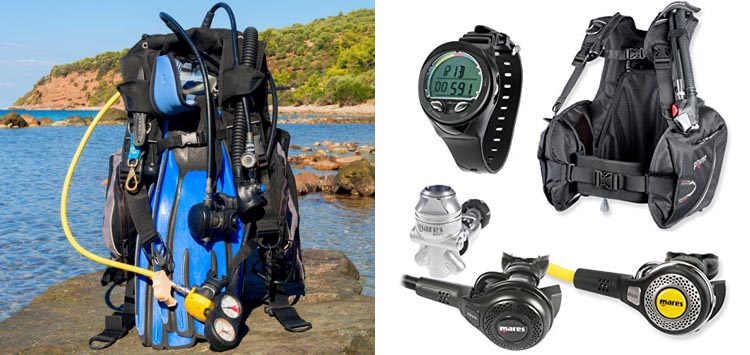Are Scuba Gear Packages Cheaper Than Buying Items Separately?

Investing in scuba gear is an exciting step for any diver, whether you’re just starting out or looking to upgrade your equipment. But with so many choices available, you might be wondering: is it cheaper to buy a scuba gear package or purchase items individually?
Let’s explore the pros and cons of each approach to help you make an informed decision.
What Is a Scuba Gear Package?
A scuba gear package is a bundled set of essential diving equipment, sold together at a combined price. While the exact contents can vary, most packages include a combination of:
- Buoyancy Control Device (BCD)
- Regulator (first and second stage)
- Octopus (alternate air source)
- Pressure gauge or console
- Mask, snorkel, and fins (in some packages)
Packages are often tailored for different experience levels, with beginner sets focused on ease of use and affordability, while advanced packages may include higher-performance gear.
Benefits of Buying a Scuba Gear Package
There are several advantages to buying a complete gear package rather than selecting items separately:
- Cost savings: Packages are typically priced lower than the total cost of buying each item individually. Retailers often apply a bundled discount to encourage complete purchases.
- Gear compatibility: Buying a package ensures that all components work well together, particularly important for regulators, hoses, and gauges.
- Convenience: It’s quicker and easier to get everything you need in one go, rather than researching and buying each piece separately.
- Extras included: Some packages come with added bonuses, such as a gear bag, free servicing for the first year, or a discounted dive computer.
If you’re looking for value and simplicity, exploring available scuba diving gear packages Australia is a great way to compare options tailored to different needs and budgets.
Potential Drawbacks of a Package
While packages offer clear benefits, they may not be the perfect solution for everyone:
- Limited flexibility: Packages may not let you choose specific brands, models, or features for each item.
- Not fully personalised: If you have particular preferences or need specialised equipment (e.g., cold-water regulators), a package might not suit.
- Items you don’t need: Some packages include accessories you might already own or won’t use, adding unnecessary cost.
Price Comparison: Package vs Separate Purchases
Generally, buying a package saves anywhere from 10% to 20% compared to purchasing items individually. The exact savings depend on the retailer and brands included. In some cases, packages also include promotional discounts that aren’t available for single items.
However, if you’re only upgrading one or two pieces, it may be cheaper to buy them separately rather than purchasing a whole new set.
When Does Buying Separately Make Sense?
Buying items individually can be a better choice if:
- You have strong preferences for specific brands or models
- You want to mix and match gear for different types of diving
- You’re upgrading gear piece by piece over time
- You already own some components and don’t need a full set
Other Factors to Consider
Beyond price, think about:
- Warranty coverage: Some packages offer extended or combined warranties.
- Servicing options: Check if packages include discounted servicing or free inspections.
- Fit and sizing: Packages might have standard sizing; buying separately allows more customisation for masks, wetsuits, and fins.
Final Thoughts: Which Option Is Right for You?
If you’re new to diving or want to refresh your entire kit, a scuba gear package offers convenience, compatibility, and cost savings. On the other hand, experienced divers who know exactly what they want—or who only need a few upgrades—may benefit from buying individual items.
Consider how often you dive, your budget, and your specific gear preferences before deciding. Either way, investing in quality equipment will enhance your comfort, safety, and enjoyment underwater.


